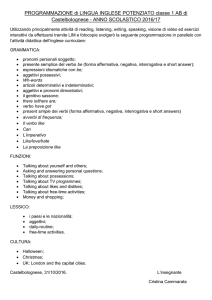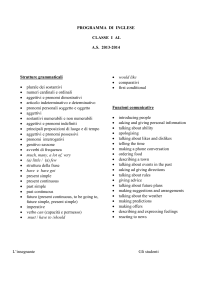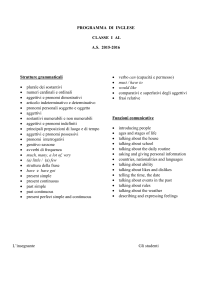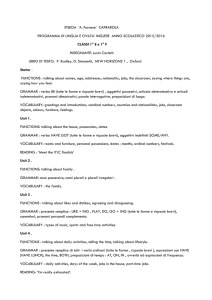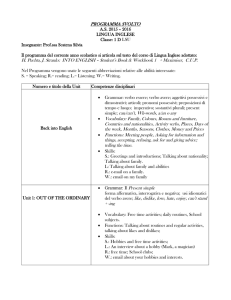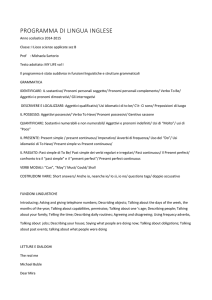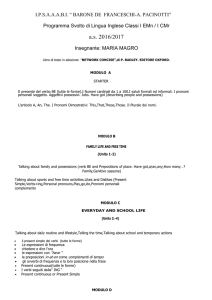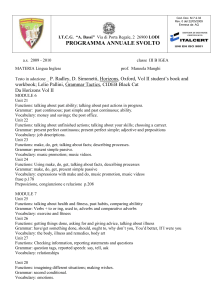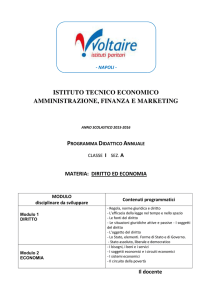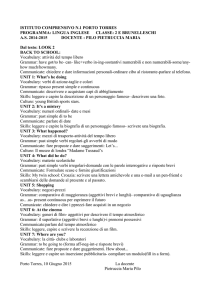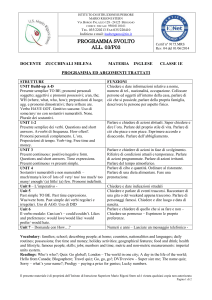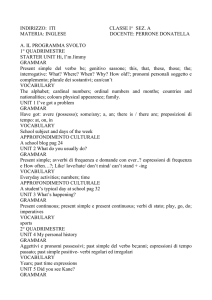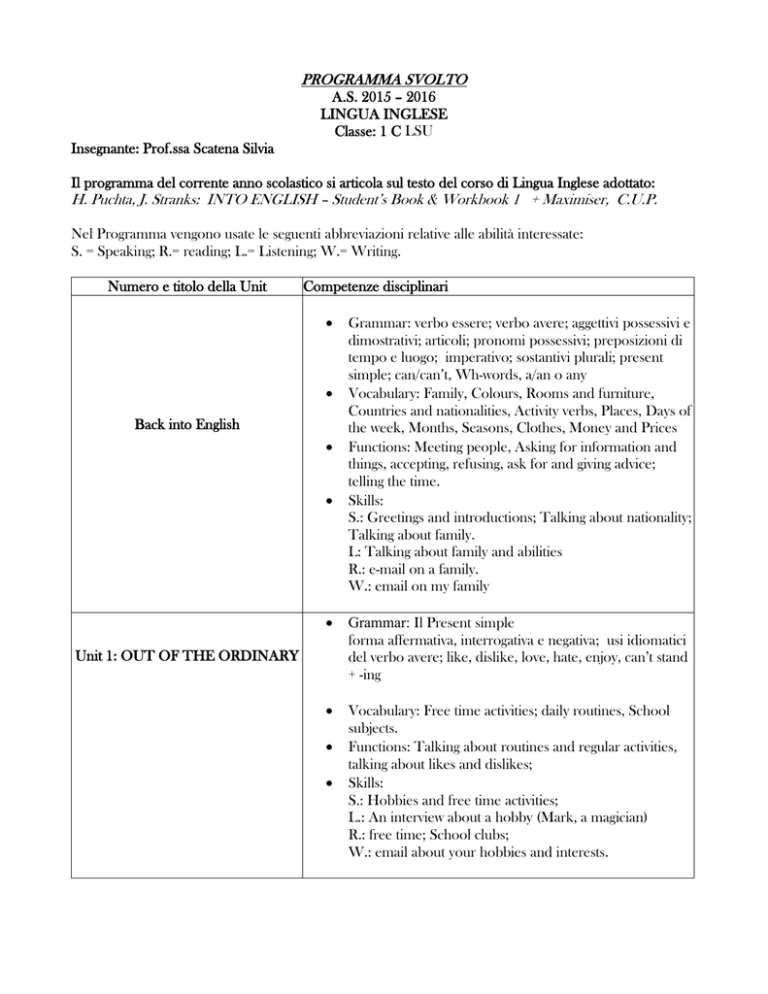
PROGRAMMA SVOLTO
A.S. 2015 – 2016
LINGUA INGLESE
Classe: 1 C LSU
Insegnante: Prof.ssa Scatena Silvia
Il programma del corrente anno scolastico si articola sul testo del corso di Lingua Inglese adottato:
H. Puchta, J. Stranks: INTO ENGLISH – Student’s Book & Workbook 1 + Maximiser, C.U.P.
Nel Programma vengono usate le seguenti abbreviazioni relative alle abilità interessate:
S. = Speaking; R.= reading; L.= Listening; W.= Writing.
Numero e titolo della Unit
Competenze disciplinari
Back into English
Grammar: verbo essere; verbo avere; aggettivi possessivi e
dimostrativi; articoli; pronomi possessivi; preposizioni di
tempo e luogo; imperativo; sostantivi plurali; present
simple; can/can’t, Wh-words, a/an o any
Vocabulary: Family, Colours, Rooms and furniture,
Countries and nationalities, Activity verbs, Places, Days of
the week, Months, Seasons, Clothes, Money and Prices
Functions: Meeting people, Asking for information and
things, accepting, refusing, ask for and giving advice;
telling the time.
Skills:
S.: Greetings and introductions; Talking about nationality;
Talking about family.
L: Talking about family and abilities
R.: e-mail on a family.
W.: email on my family
Grammar: Il Present simple
forma affermativa, interrogativa e negativa; usi idiomatici
del verbo avere; like, dislike, love, hate, enjoy, can’t stand
+ -ing
Vocabulary: Free time activities; daily routines, School
subjects.
Functions: Talking about routines and regular activities,
talking about likes and dislikes;
Skills:
S.: Hobbies and free time activities;
L.: An interview about a hobby (Mark, a magician)
R.: free time; School clubs;
W.: email about your hobbies and interests.
Unit 1: OUT OF THE ORDINARY
Unit 2:
BEING USEFUL
Unit 3:
EXCEPTIONAL PEOPLE
Unit 4:
MAKING FRIENDS
Unit 5:
GETTING TO THE TOP
Grammar: Present continuous vs present simple; Gli
avverbi di frequenza, I pronomi personali complemento
Vocabulary: Housework , every day English;
Functions: Talking about activities happening now; say
what people are doing; Talking about housework;
Skills:
S: Volunteer work, housework, what you are doing;
L.: Interview (Mike); Song: Lemon tree;
R.: Helping at a hospital;
W.: organizing a party.
Grammar: past simple del verbo to be (was/were) e dei
verbi regolari
Vocabulary: Phrasal verbs, Memory words;
Functions: Talking about the past, Talking about dates of
birth.
Skills:
S.: talking about our heroes;
R.: Making a difference; Remembering heroes;
W.: a text on our hero
Grammar: Past Simple dei verbi irregolari e regolari;
Domande e risposte brevi con i verbi al passato
Vocabulary: Past Time expressions; Sports, Every day
English;
Functions: Talking about the past, Talking about sports;
Skills:
S.: Talking about friends, sports and the past;
L.: Song: You’ve got a friend in me;
R.: Friends make History
Grammar: Have to/ don’t have to, Genitivo sassone,
pronomi possessive, WHOSE…?
Vocabulary: JOBS;
Functions: Talking about obligation, Talking about
possession;
Skills:
S.: talking about jobs;
L.: Teenagers’ career plans;
R.: The X-factor; Following a dream
W.: describing a job
Unit 6:
EAT FOR LIFE
Unit 7:
LEARNING LANGUAGES
Unit 8:
PLANET HOLIDAY
Unit 9 :
IT’LL NEVER HAPPEN
Grammar: Comparativi e superlativi degli aggettivi;
Vocabulary: Language learning;
Functions: Making comparisons;
Skills:
S.: talking about learning Languages;
R.: A language Learning Legend;
W.: How I learn new vocabulary
Grammar: Present continuous per esprimere programmi
futuri
Vocabulary: Future time expressions, holiday activities;
Functions: talking about future arrangements;
Skills:
R : Holiday dreams, Talking about holidays activities,
S: Discussing holiday plans;
W: writing an e-mail on a future holiday.
Grammar: WILL/WON’T : previsioni per il futuro;
futuro con if, untill, when, as soon as + presente
Vocabulary: Expressions to talk about the future;
Functions: making predictions, talking about future
possibility/certainty.
Skills:
S.+W: Predicting lifestyle in the future;
R.: Wrong predictions.
Grammar: Countable and uncountable nouns; much /
many, a lot/lots of, a/an, some/any, How much, How
many;
Vocabulary: Food and drink;
Functions: Talking about food and drink; Expressing
quantity;
Skills:
R.: A long and Healthy life,
W.: paragraph on food and lifestyle
Unit 10:
RUN FAST, STUDY HARD
Dalla Grammatica in adozione
“Grammar Reference Classic”
Grammar: Too + aggettivi; Avverbi regolari e irregolari
Vocabulary: Expression to talk about the future;
Functions: Talking about the weather, Telling someone’s
life story.
Skills: L. +R.: Jungle Survival
Unità “BASICS”
1 Infinito
2 Pronomi personali soggetto e verbo essere
3 Gli interrogativi
4 I sostantivi
5 Gli articoli indeterminativi e indeterminativi
6 Gli aggettivi
7 I Dimostrativi
8 Aggettivi possessivi
9 There is, there are
10 Presente di to have
11 some/any/no
12 Much/many, a lot of/lots of
14 Imperativo
15 Pronomi personali complemento
16 Forma possessiva del nome
17 I pronomi possessivi
18 Il Present Simple
20 Have come verbo di azione
21 Gli avverbi di frequenza
22 Gli interrogativi
23 Alcune preposizioni di tempo
24 Alcune preposizioni di luogo
25 Present Continuous
26 I numeri cardinali
27 L’ora
28 I numeri ordinali, la data
Unità “Il verbo e la frase”
Il presente
Il present Simple;
1.2 Il Present Continuous
2 Il Passato
2.1 Il Past Simple di to be
2.2Il Past simple
3 Il Futuro;
3.1 Be going to
3.2 Il futuro con will
Unità “Gli elementi della frase”
7.2 – Gli Aggettivi in –ed e in –ing
8 - Comparativi e superlativi
Say it right:
casa; cliente; figli; ladro; alto; bello; brutto; buffo; grande,
piccolo; presto; dire; spend/save/waste time or money
Some false friends
Socialising:
saying hello and good bye; meeting people you know;
introductions; thanking and replying to thank you;
Apologising and responding to apologies; Offers,
invitations and polite refusals
Vocabulary and CLIL Resource Book
Daily life
Items of clothing
Food and drink
Describing people
Around town
The weather
House and Home (p.84/86)
Elementi di cultura
e civiltà inglese
(CLIL)
Elementi di geografia delle Isole Britanniche;
Principali luoghi di interesse in Inghilterra, Scozia, Galles
e Irlanda;
Elementi di Storia delle origini delle Isole Britanniche;
Sito di Sutton Hoo;
Esercitazioni su vocaboli relativi a: geografia, storia,
descrizione di castelli, armature e ami tipiche delle
popolazioni che hanno invaso le isole britanniche;
Leggenda di Robin Hood (cosa è una leggenda, luoghi
dove Robin Hood ha vissuto e personaggi principali della
storia, simbologia dellom scontro fra bene e male – ruolo
dell’Hero e del Villain)
Testi adottati:
INTO ENGLISH – Student’s Book & Workbook 1 + Maximiser, ed. Cambridge University
Press – Loescher - H. Puchta, J. Stranks
Grammatica : Grammar Reference Classic & Vocabulary and CLIL Resource Book
ed.Petrini Mariagiovanna Andreolli - Pamela Linwood.
Nel corso dell’anno è stato visto il film “Robin Hood, Prince of Thieves”.
Gli alunni sono stati consigliati all’ascolto di diversi esercizi di listening su siti vari, consultati prima
insieme in classe e poi da effettuarsi a casa come esercitazioni individuali.
Sono stati poi messi a disposizione degli studenti del gruppo di potenziamento dei libri di lettura, dei
quali è stata fatta una presentazione in piccoli gruppi e alla classe.
Lucca, 08 giugno 2016
Prof.ssa SCATENA SILVIA
______________________________________
I Rappresentanti di classe
________________________________________
________________________________________

